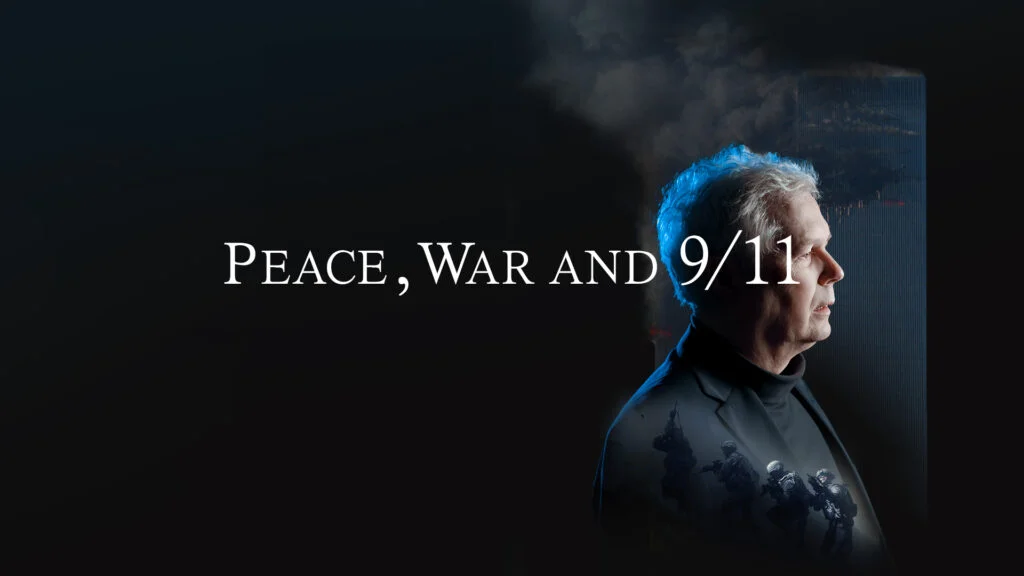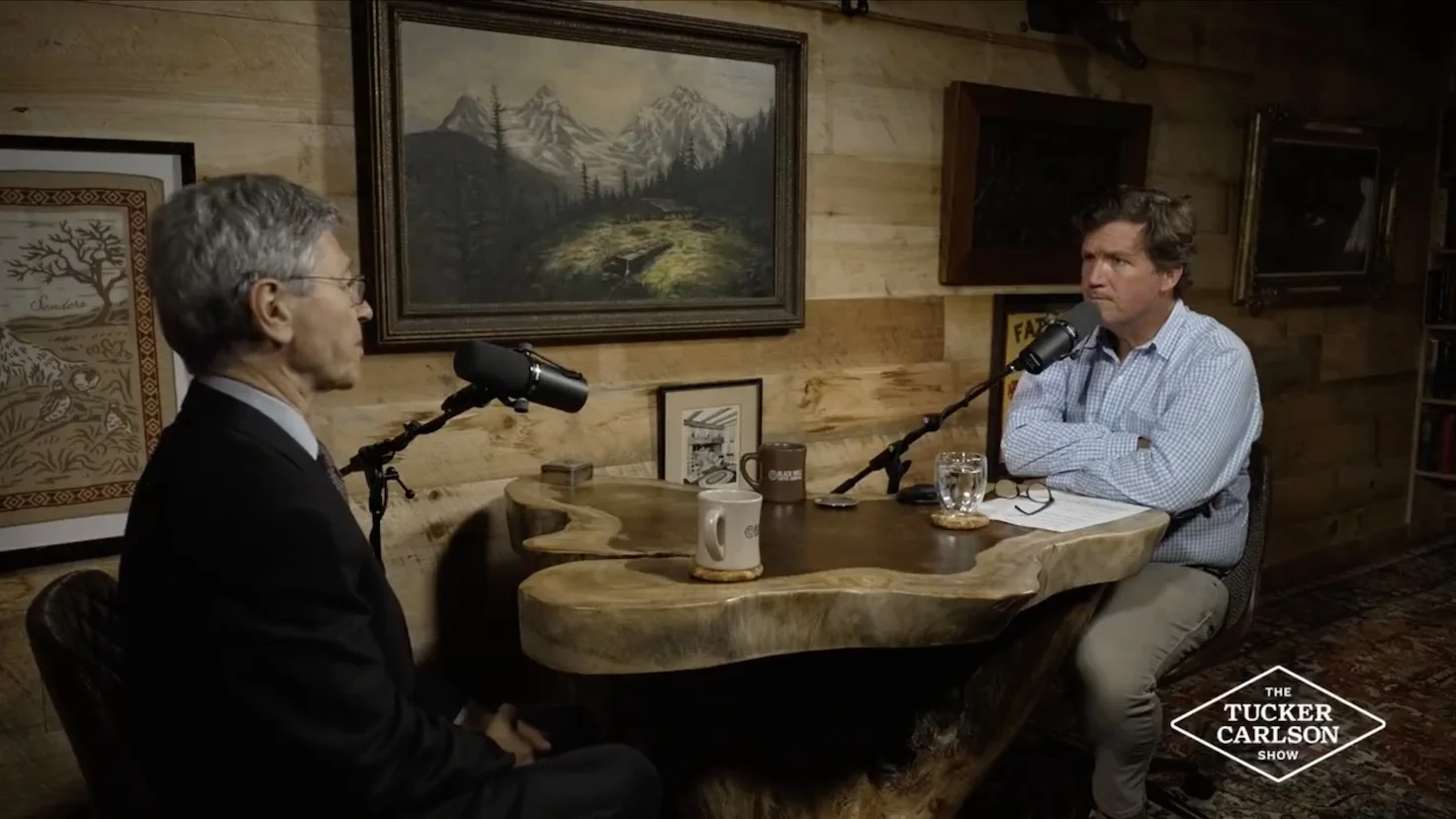In a major interview this week with Tucker Carlson, Professor Jeffrey Sachs spelled out in unambiguous terms the nature and reality of the current seismic shifts occurring in the Middle East.
Back in 2018, in a remarkable MSNBC interview, Sachs wrong-footed his interviewers by revealing the US’s covert involvement in the war in Syria. In a debate framed around the question of whether the US should intervene in Syria, Sachs shocked the table of talking heads by informing them it was already intervening via a covert and completely illegal “regime change” operation, called Timber Sycamore, aimed at overthrowing the Syrian government. Finally, a little bit of truth about US policy in Syria had been brought to the attention of MSNBC’s viewers.
In this week’s interview with Tucker, with the world trying to make sense of the rapid collapse of the Syrian government and its takeover by the extremist group Hayat Tahrir al-Sham (HTS), Sachs goes even further. He places events in Syria in the proper context of the post-9/11 “global war on terror” and its associated “regime change” war policy. Citing Wesley Clark’s famous 2007 claim on Democracy Now, Sachs informs Tucker of the US plan to overthrow seven countries in five years and identifies the targeted countries as Iraq, Syria, Lebanon, Libya, Somalia, Sudan and, finally, Iran. Others besides Clark have testified to the existence of such plans, and documented communications between British Prime Minister Tony Blair and US President George W. Bush in the immediate aftermath of 9/11, in which multiple “regime change” wars were discussed, have been in the public domain since 2016.
If there is one point of difference we have with Sachs, it is that he describes these “regime change” wars as “Netanyahu’s wars,” fought by the US “on behalf of Israel.” We regard them as being as much about US imperialism, or “primacy” — a concept referred to and decried by Sachs in the interview — as about Israeli primacy in the region (aka “Greater Israel”).
Notwithstanding Sachs’ take on the driving force behind these wars, the kind of clarity and context he provides is absolutely essential. The Syrian government did not fall just like that. It was destroyed as part of the “regime change” war policy that was implemented in the wake of 9/11 and that has led to massive suffering and death as the US-led campaign has moved through its target states: Afghanistan, Iraq, Libya, Syria, and Lebanon. Sachs did not mention Afghanistan in the list of “regime change” wars, but the 2001 invasion of Afghanistan was undoubtedly such a war, toppling the Taliban government while Osama bin Laden and thousands of Al-Qaeda fighters, ostensibly the target of the US and its allies’ operations, were allowed safe passage into Pakistan. Thus, the “regime change” campaign really began in 2001.
The context offered by Sachs is also essential because it provides an opportunity for Tucker’s audience to start to make sense of the remarkable fact that the group now in charge in Syria and its leader, Mohammed al-Jolani, are designated as wanted terrorists by the US government. Jolani was previously a key player in the terror groups Al-Nusra front in Syria and, prior to that, Al-Qaeda in Iraq. A purported “global war on terror” against non-state group “Al-Qaeda” leads to the destruction of multiple countries and ends up placing an Al-Qaeda-linked group in charge of Syria. The contradictions are glaring, and obvious questions are begged: Was Al-Qaeda, in fact, always on “our side,” and what would be the implications of that for understanding what actually happened on 9/11?
Later in the interview, the opportunity arises to provide an answer. Tucker asks Sachs if he expects classified documents on 9/11 to be released by the incoming Trump administration. Having just warned of how perilously close we are to nuclear war because of repeated US provocations — “we are trying to survive at a time of maximum global peril” — Sachs declares that massive disclosures have the power to change everything about our current course. “If it could only be, this would change so much,” Sachs exclaims.
The door is wide open at this point in the interview to address the proverbial elephant in the room: Was there an alliance between the US and Al-Qaeda, and was 9/11 actually a surprise attack on the US by Islamic terrorists? Tucker, unfortunately, makes a noticeable misstep at this point by suggesting that large-scale declassification might reveal why Al-Qaeda decided to attack the US. This falling back by Tucker takes the viewer straight back to a thesis, articulated by Noam Chomsky in 2001, that 9/11 was a case of “blowback,” prompted by decades of unjust and violent US foreign policy. This thesis has been particularly effective over the years at setting the boundaries of acceptable criticism and debate when it comes to 9/11.
Fortunately, Sachs takes his answer in a different direction and, instead, emphasizes the long history of covert CIA operations, only ever scrutinized once during the Church Committee in 1975. He points out that when that single instance of partial scrutiny occurred, it revealed “evil,” such as multiple assassination plots and the Project MKULTRA mind control program. He testifies to being aware of further “secretive operations” since then, to having experienced US-sponsored coups, and to the fact that the US has repeatedly gone to war on “false pretenses.” In a remarkable statement, which we at IC911 endorse unreservedly, Sachs tells Tucker:
Whether any of this is ever found, I don’t know. But if it is, it would change the course of America back to a true republic. Because what happened in this country is that we were overtaken by the security state, and we became a system of confidentiality and unaccountability. And it’s a big, massive machine, and a lot of people are paid to keep quiet or to salute whatever the military industrial complex or the intelligence agencies are doing without asking questions. Because when you have one-and-a-half trillion dollars a year spent on that, you’re a pretty big business. And it has affected the universities, the think tanks — of course, the Congress, which asks no questions of any serious kind. And so, major, major events of fundamental significance for our insecurity take place without any truth-telling at all.
He then notes that the most important thing Trump can do is to embark on a policy of wide-ranging declassification.
At this point it seems clear that the conversation is on the very cusp of acknowledging what is, for the mainstream bubble, a still unthinkable thought: that 9/11 itself was a self-inflicted wound, a so-called “false flag” or “manufactured war trigger.” But neither Sachs nor Tucker seem able to go to there. They fall at the last hurdle.
We are inclined to view this interview, now seen by over 30 million people on X, as a moment when a potentially revolutionary truth was almost delivered to a large swath of the American public. It is the truth that the deep state is out of control, as departing US President Eisenhower warned in 1961; that a string of assassinations, including the CIA’s murder of President John F. Kennedy in 1963, has determined the course of US history; and that all of America’s wars have been fought on lies. What Sachs left out is that 9/11, the very catalyst for the series of “regime change” wars he described, was no exception to the rule. Indeed, it was a brazen deception that America was attacked on 9/11 by a band of young Muslim men who remarkably succeeded in hijacking four airliners, evading US air defenses, and bringing down three skyscrapers in New York.
This truth, if known by enough of the American people soon enough, would indeed change the course of history. And, as Sachs hints, this may very well be necessary in order to avoid a catastrophic global conflict.
In the final analysis, people in positions of influence, as Sachs and Tucker undoubtedly are, need to go that extra mile and spell out the true nature of 9/11, what has happened to the world since, and what this means for our safety and security and that of future generations. The boy who cried out that the emperor had no clothes needed to actually say it, otherwise the spell could not be broken.
If Sachs and Tucker still need to find the requisite courage and knowledge, they could perhaps look to the life and work of the late Professor Graeme MacQueen, documented in our film Peace, War and 9/11.

For the truth to finally set us free, we need more from the likes of Sachs and Tucker. They and many others have done much in recent years to enhance public understanding and raise awareness. They must now find the courage within themselves to take that final step.
It is not just in Trump’s hands. Prominent voices amplified by the independent media of today also have the power, if properly harnessed, to change the course of history.
Dr. Piers Robinson is research director of the International Center for 9/11 Justice. Ted Walter is executive director of the International Center for 9/11 Justice.



